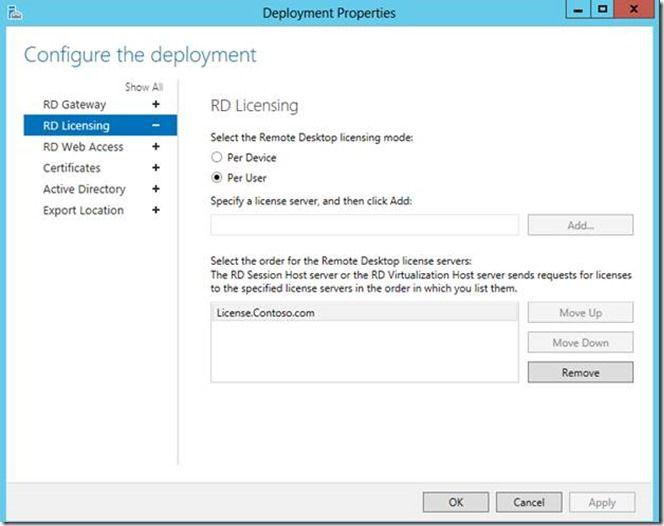A Remote Desktop Session Host (RD Session Host) server must be able to contact a Remote Desktop license server to request Remote Desktop Services client access licenses (RDS CALs) for users or computing devices that are connecting to the RD Session Host server.
In Windows Server 2008 R2, you must specify a license server for the RD Session Host server to use. Automatic license server discovery is no longer supported for an RD Session Host server that is running Windows Server 2008 R2.
An RD Session Host server running Windows Server 2008 R2 can contact a license server running either Windows Server 2008 R2 or Windows Server 2008 to request RDS CALs.
Use the following procedure to specify a license server for the RD Session Host server to use by using the Remote Desktop Session Host Configuration tool.
Membership in the local Administrators group, or equivalent, on the RD Session Host server that you plan to configure, is the minimum required to complete this procedure. Review details about using the appropriate accounts and group memberships at https://go.microsoft.com/fwlink/?LinkId=83477.
To specify a license server for the RD Session Host server to useOn the RD Session Host server, open Remote Desktop Session Host Configuration. To open Remote Desktop Session Host Configuration, click Start, point to Administrative Tools, point to Remote Desktop Services, and then click Remote Desktop Session Host Configuration.
If the User Account Control dialog box appears, confirm that the action it displays is what you want, and then click Yes.
In the Edit settings area, under Licensing, double-click Remote Desktop license servers.

On the Licensing tab of the Properties dialog box, click Add.
In the Add License Server dialog box, select a license server from the list of known license servers, and then click Add. If the license server that you want to add is not listed, in the License server name or IP address box, type the name or IP address of the license server that you want to add, and then click Add.
You can add more than one license server for the RD Session Host server to use. The RD Session Host server contacts the license servers in the order in which they appear in the Specified license servers box.
Click OK to close the Add License Server dialog box, and then click OK to save your changes to the licensing settings.
You can also specify a license server for the RD Session Host server to use by applying the Use the specified Remote Desktop license servers Group Policy setting. This Group Policy setting is located in Computer Configuration\Policies\Administrative Templates\Windows Components\Remote Desktop Services\Remote Desktop Session Host\Licensing and can be configured by using either the Local Group Policy Editor or the Group Policy Management Console (GPMC). Note that the Group Policy setting takes precedence over the license servers configured in Remote Desktop Session Host Configuration.
For more information about Group Policy settings for Remote Desktop Services, see the Remote Desktop Services Technical Reference (https://go.microsoft.com/fwlink/?LinkId=138134).
You can also use the Remote Desktop Services module for Windows PowerShell to configure RD Licensing-related settings. For more information about using Windows PowerShell with Remote Desktop Services, see the Remote Desktop Services Technical Reference (https://go.microsoft.com/fwlink/?LinkId=139898).
For more information about RD Licensing, see the Remote Desktop Services page on the Windows Server 2008 R2 TechCenter (https://go.microsoft.com/fwlink/?LinkId=140434).
PREV: How To Install Webmin And Secure With Apache On Ubuntu 18.04 ...
NEXT: How to Install Virtualmin with Webmin on Ubuntu - Interserver ...